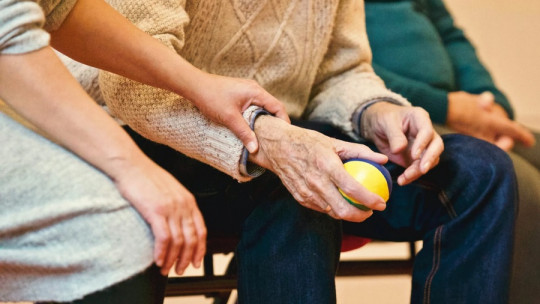
Care for the elderly, sick or dependent people must be guaranteed in any modern society that prides itself on safeguarding the interests and integrity of its citizens.
Now, applying these measures requires considering some physical and psychological characteristics linked to these jobs supporting vulnerable people. Therefore, in this article I will explain the main effects of burnt out caregiver syndrome.
What is burnt out caregiver syndrome?
The people who have them are dedicated to offering social-health care as a profession. They are usually dedicated professionals who put all their effort daily into doing the best possible job with the people who need them.
In Spain, offering this type of care is a generally vocational task that generates great satisfaction in people who pour themselves body and soul into the care of others.
However, this type of work aimed at helping other people can sometimes cause certain problems, both in terms of physical and mental health. The best known of these psychological problems or disorders is caregiver burnout syndrome, an alteration that affects thousands of people daily in our country.
We can define this syndrome as a set of symptoms that affect people who dedicate themselves intensely to the care of others and who, due to lack of rest, In their efforts they end up developing anxiety disorders, stress, depression, muscle problems and all kinds of psychological and psychosomatic disorders.
What are the physical and mental effects of burnout caregiver syndrome?
There are many psychological disorders that can appear in people who develop caregiver burnout syndrome, among the most common we can highlight cases of sustained anxiety, insomnia, and the inability to regulate explosions of anger.
These symptoms usually appear progressively in the mental health of the person, the longer they develop this syndrome and they can worsen if they are not treated as soon as possible by a qualified psychology professional.
Let’s see what are the most common and important effects of burnt out caregiver syndrome.
1. Exacerbated fatigue
Tiredness, permanent fatigue, and muscle or other pain are some of the physical symptoms that can develop with burnout caregiver syndrome.
These They generally occur together with psychological symptoms and in many cases they are caused by the psychological discomfort that the person experiences daily.
2. Sleep problems
Being continually focused on caring for a person and without time to rest at any time can also cause real disorders in the person’s sleeping habits, as well as cases of severe insomnia.
This causes a rest deficit due to the person’s inability to sleep properly which causes a higher level of overload throughout the body, with its consequent influence on physical and mental health.
3. Feelings of guilt
Another of the classic characteristics of burnt out caregiver syndrome is a permanent feeling of guilt every time the health of the person cared for worsens, or when they end up dying.
This phenomenon is explained by the strong bond that the caregiver establishes with the person in their care. the obsession you have with taking care of your health at all costs at all times whatever happens.
In addition to that, people with burnout caregiver syndrome present obsessive perfectionism and do not forgive themselves for any mistake they may make in their work, no matter how small, because they consider that every small mistake can endanger the caregiver’s life.
4. Social isolation
Voluntary social isolation is another of the logical consequences that gradually occurs when a person dedicates their personal and professional life to caring for someone.
Burnout caregiver syndrome is characterized by the progressive loss of personal interests as well as an increasingly accentuated lack of interest in carrying out any social or recreational activity with friends or family.
5. Interpersonal difficulties
In addition to this loss of interest in attending celebrations or social gatherings of all kinds, they are also common difficulties relating positively to other people both with strangers and with loved ones and families.
Increasing irritability, mood swings, and physical and mental exhaustion make it impossible to carry out effective, adaptive, and satisfactory interpersonal relationships.
6. Sudden changes in weight
People with burnout caregiver syndrome also tend to quickly abandon their physical image, a direct consequence of a decrease in their self-esteem.
This phenomenon means that many of them end up gaining weight or losing it in a short time, due to a sudden loss of appetite.
7. Cognitive impairment
Caregiver burnout syndrome is also accompanied by a series of cognitive impairments that affect the person’s proper functioning in their daily lives, such as for example memory or concentration problems.
Are you looking for professional psychological support?
If you are interested in having psychological assistance for problems related to the professional field, I invite you to contact me.
My name is Thomas Saint Cecilia and I am a psychologist for adults and adolescents.








